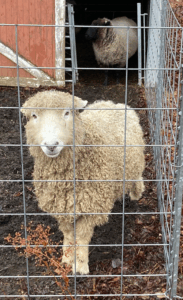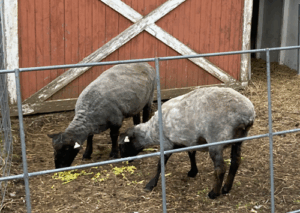Ever since Covid, I’ve been a transplanted (from NYC) Vermonter, living the good life in what used to be our (long) weekend house.
Among the many dreams I indulged when we went from racing back and forth along the Merritt or Taconic for three-day weekends once a month or so to full-timers was to get sheep.
As a vegetarian, I had no intention of eating them. They were to mow the grass in order to cut down on all the CO2 emissions our sit-down mower was spewing. (I read somewhere, maybe in The Times, that an hour on the mower produced as much carbon emissions as driving to Florida.)
(Every time I explain why we have sheep, my husband, who really likes lamb chops, reminds me and anyone who will listen that it has proved to be a pipe dream. The two ewes we got were no match for the grass that grows relentlessly on our four to five acres of open field, which the (full-time) neighbors we found out snidely call “The Park.”)

Anyway, four years on, I’m indulging the rest of my rural idyll. Last January, I told my sheep mentor – a very local guy with a farm (about 30 sheep and the same number of goats), and a business providing fencing, vet services, shearing and what have you to whomever and who himself is a Westchester transplant but back in the ‘70s, so he’s almost as authentic as they get up here)… Anyway, I told Cyrus (a pseudonym to convey his authenticity as a Vermonter, because, truth be told, his real name is the same latter-half of the 20th Century, popular among flatlanders name that we gave our son) that I was ready to breed my ewes. (My husband has (human) grandchildren as the result of an earlier marriage; I am an older, so far grandchildless mother. Just saying.)
So, within 36 hours of my texting Cyrus, he dropped off Aleck, the ram, for a one-month stay with Anna and Emma (named after A. Karenina and E. Bovary, a reference to the now discarded working title of the novel I’m trying to write – another giveaway of the stubborn hold that urban frippery exerts on me). Aleck, who I expected to be an ugly brute, turned out to be the most handsome sheep I’d laid eyes on (probably just proving that I hadn’t looked attentively at many sheep in my life). He had the mythic quality of something out of a Disney movie (think Lion King, but in this case Ram King). All the neighbors agreed.
Long story short, 135 days after the first day of Aleck’s visit, the ewes are in their home stretch. They’re likely to deliver within the next two weeks.

Several months ago, when my sister (LA, no sheep) began asking on our weekly calls if the ewes were looking pregnant, I asked Cyrus what he thought, and by the way, what was going to happen when the ewes gave birth? (Subtext: Was I going to have to do anything? Did attending at births come with his mentorship?)
He, with his customary light-handed disdain for my type (the transplanted city moron) said sheep had been giving birth quite successfully for eons without the help of humans. So, don’t read the 20 pages about abnormal births in your “Raising Sheep the Modern Way” book. Read the one page on normal ones. “Abnormal births are abnormal.”
Then, last week, the story got a little more complicated when I called Cyrus about problems with my solar fence charger. Oh, he said, he’d been planning to bring over some gates to make me some lambing pens and he could take a look at the charger at the same time.
A few days later, he arrived, fiddled with the energizer a bit, put up the gates for the lambing pen, then paused, standing on the hay and sheep poop piled high in the barn from the winter, and set into what turned out to be, “the talk.”
First, he said, I’d know when the ewes were about to go into labor when their tails stuck up – that was their cervical muscles relaxing.
They’d start nesting – I assumed that meant mounding up the hay in their pen in the barn.
And emitting strange noises.
And pawing.
Then, when they were just about to lamb, they would emit a mucous plug, a precursor to their water breaking. *At this point, I was to get them into their lambing pen even though they wouldn’t want to budge from where they’d deposited the plug since in doing so they were marking their spot.
And, for god’s sake, don’t forget to remove the water bucket so they don’t drop a lamb in the bucket and drown it. (Anecdote here about Vermont transplant who didn’t remove bucket. “Some people just have no common sense.” It was all too possible I was one of them.)
And, don’t keep running out to look at them to see if they’re in labor – you’ll make them nervous.
And, if they’re not progressing after 30-45 minutes, they may need help.
Not progressing means you see the nose and a leg or some such of the lamb sticking out but they’re not continuing to inch out.
So, have your “go kit” ready with sterilized kitchen string – to be hooked onto the showing leg and chin (around the teeth he clarified, when asked), and, if you see one leg but not the other, for example, stick your hands (washed with Ivory soap and then lubricated with said soap) and, holding onto the strings so the showing nose and leg don’t slip back in while you’re trying to pull out the second leg, pull out the leg.
When the lamb’s out, snip the umbilical cord (scissors are fine, sterilization not necessary, “barns are dirty”) if it’s not already broken, wipe with Betadine (“You can’t buy high concentration iodine anymore because it’s used for making methamphetamines”). (LA sister: “You learn the darndest things.”)
And, wipe the mucus (mucus is the noun; mucous is the adjective) from the lamb’s nose if the mom hasn’t done it already, and wipe that mucus on the mom’s nose if she’s ignoring the lamb.
And, help the lamb find the mom’s teat if it’s having trouble and get the colostrum flowing (if it’s not) by squeezing versus stripping the teat. (Stripping – you squeeze the top of the teat so milk doesn’t flow back up and squeeze down from there. Stripping – you squeeze from the top, no need to ring off the top. Huh?)
Oh, and try to grab the afterbirth and get rid of it before mom eats it. Not critical but preferable.
If there’s a second one, return to * above.
Once the second (or heaven forbid, third) lamb is out, if the mom is ignoring one of them, wipe Vicks Vaporub on the ewe’s nose so it can’t tell the difference between the scents of her lambs (and therefore will embrace, sheep version, all of them).
Assuring Cyrus that I understood that sheep have been doing this for centuries without our help and that I wasn’t supposed to read the 20 pages, I timidly asked “What if” about complications.
“If the back feet show first, it’s breech and don’t worry. They can handle this on their own.”
‘And, all the other positions, well, call my wife (she’s a nurse for humans) or my son. I’ll be on Martha’s Vineyard shearing the 300 sheep there. Or, call your neighbor (another real Vermonter, transplanted from Massachusetts in the ‘70s) who’s delivered a passel of goats in her day. Oh, and give the mom a bucket of hot water and molasses after she’s done.
“She’ll love it.”
“Is this likely to happen at night,” I asked, imagining a very sleepless night, or two, dragging myself to the barn every few hours, checking to see if the action has started. And, more importantly, I’m terrified of going out at night because the property across the road is ringed with signs, with AK-47s on them, informing passersby that said property is “protected by the 2nd Amendment.” (The pungency of this warning took on new meaning when, after Cyrus, delivering Aleck, backed into our neighbor’s driveway to turn around, said neighbor emerged to bellow at us to never let it happen again. As I said, we’re living the good life here in Vermont.)
“No,” Cyrus said, “not necessarily” at night.
And, then came a lifetime’s (Cyrus’s) worth of stories about clueless transplants playing at sheep farming, keeping watch on their sheep when birth was imminent, setting up on a stool in the barn, blasting their iphone playlists, and generally driving the ewes nuts.
“You might just wake up one morning and be greeted by a few more sheep.”
Sounds good to me.
N. B. If you know anyone who wants some five-month-old lambs – after I’ve had my lamb adorableness experience – and who will sign an affidavit that they won’t eat them, please be in touch.